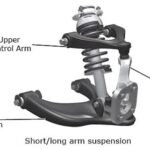Importing a car into the United States involves navigating a complex web of regulations set by various government agencies. This comprehensive guide outlines the crucial requirements and procedures to ensure a smooth import process.
Essential Standards for Import Cars
Imported vehicles must adhere to stringent safety, bumper, and emission standards established by US law. These regulations aim to ensure the safety and environmental compliance of all vehicles on American roads. Key legislation includes:
- Motor Vehicle Safety Act of 1966 (revised under the Imported Vehicle Safety Compliance Act of 1988): Dictates safety standards.
- Motor Vehicle Information and Cost Savings Act of 1972: Sets bumper standards, effective from 1978.
- Clean Air Act of 1968 (amended in 1977 and 1990): Governs air pollution control standards.
Foreign dealers may claim compliance, but independent verification is crucial. Non-compliant vehicles face mandatory modifications, export, or destruction.
Key Agencies and Resources for Import Cars
Before purchasing a vehicle for import, contacting relevant agencies is highly recommended due to evolving requirements.
-
US Customs and Border Protection (CBP): Oversees import procedures. Contact your nearest CBP office or visit their website for information on entry processes and documentation.
-
Environmental Protection Agency (EPA): Enforces emission standards. Their Automotive Imports Facts Manual and Imports Hotline at (734) 214-4100 offer detailed guidance. The EPA website provides further resources on importing vehicles and engines.
-
Department of Transportation (DOT): Regulates safety and bumper standards. Consult their vehicle hotline at (202) 366-5291 or their website for information on compliance procedures.
Import Restrictions and Prohibitions
Importations involving governments of certain countries (Afghanistan (Taliban), Cuba, Iran, Iraq, Libya, North Korea, Sudan, Serbia/Montenegro/Kosovo, or Yugoslavia) are generally prohibited under regulations from the Treasury Department’s Office of Foreign Assets Control. Contact this office for licensing information before attempting such imports.
Pre-Import Preparations for Your Car
Shipping arrangements are the importer’s responsibility. Timely notification from your shipper enables efficient CBP processing upon arrival. CBP prohibits officers from acting as import agents, but commercial brokers can be hired. Clearance requires documentation like the bill of lading, bill of sale, foreign registration, EPA form 3520-1, and DOT form HS-7.
Ensuring a Clean Undercarriage for Import Cars
The US Department of Agriculture mandates a clean undercarriage to prevent pest importation. Thorough steam-cleaning or cleaning before shipment is essential.
Avoiding Common Import Mistakes
Using your car for personal belongings is strongly discouraged due to theft risk, shipper refusal, declaration requirements, and potential penalties for illegal conveyance.
Duty and Tax Implications for Import Cars
Imported vehicles are generally subject to duties:
- Autos: 2.5%
- Trucks: 25%
- Motorcycles: 2.4% or free
Returning US residents may apply a $800 CBP exemption towards the vehicle’s value under specific conditions. A 3% flat duty applies to the next $1,000, with the remainder subject to the regular rate. Certain exemptions for duty-free entry exist for US citizens employed abroad, government employees, nonresidents (under specific conditions), and vehicles complying with the USMCA (United States-Mexico-Canada Agreement). However, meeting USMCA requirements can be challenging for vehicles produced before 2020.
Importing Vehicles for Special Purposes
Vehicles for racing or other specific purposes require prior written approval from EPA and DOT. Temporary imports for testing, demonstration, or racing are allowed under specific conditions. Permanent imports for show or display require DOT approval and adherence to emission standards.
Meeting Safety and Compliance Standards
Vehicles under 25 years old generally must comply with Federal Motor Vehicle Safety Standards (FMVSS). Post-1978 vehicles must meet bumper standards, and post-1987 models must have theft-prevention systems. Certification labels indicate compliance. Non-conforming vehicles require modification by a DOT-registered importer (RI) and a DOT bond. The cost and feasibility of modifications should be considered before purchase. A list of importable non-conforming vehicles is available from RIs and the NHTSA website.
Federal Tax on Imported Cars
Some imported vehicles incur a gas-guzzler tax based on fuel economy. The EPA assigns a fuel economy rating, and vehicles with a combined rating of at least 22.5 miles per gallon are exempt. Consult the IRS for detailed information.
Emission Standards for Import Cars
Specific gasoline and diesel-fueled cars, trucks, heavy-duty engines, and motorcycles are subject to federal emission standards based on their manufacturing date. Non-conforming vehicles require importation through a certified Independent Commercial Importer (ICI). Contact the EPA for information on emission requirements and ICIs. State emission requirements may also apply.
Important Considerations Before Importing
Both DOT and EPA caution that modifying non-conforming cars for compliance can be expensive and sometimes impossible. Thorough investigation is crucial before purchase. Re-importing a previously exported US vehicle is generally duty-free with proper documentation. Commercial goods transported in private vehicles may require a user fee decal and duty payment.
Exceptions to Import Regulations
Certain vehicles are exempt from emission and safety requirements but cannot be sold in the US:
- Those imported by nonresidents for personal use under one year (must be exported after one year).
- Those belonging to specific groups like foreign armed forces or diplomatic personnel.
- Those temporarily imported for testing, demonstration, or competition (with restrictions).
Driver’s Licenses and Permits for Import Cars
International Registration Marker and International Driving Permit are recommended. US residents should consult their state’s DMV regarding temporary license plates. Specific regulations apply to nationals of countries that have ratified the Inter-American Convention of 1943 or the Convention on International Road Traffic of 1949, as well as motorists from Canada and Mexico. Foreign nationals employed in the US may use their foreign license tags under specific conditions. Consult relevant authorities for specific requirements based on your nationality and purpose of visit.
This comprehensive guide provides a foundation for understanding the complexities of importing cars into the United States. Consulting with relevant agencies and experts is essential for a successful import process.

